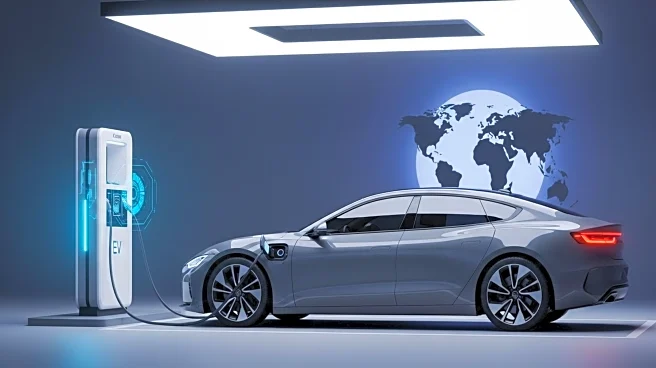What's Happening?
The electric vehicle (EV) market in China is undergoing a significant transformation as domestic manufacturers like BYD, Li Auto, XPeng, and NIO are surpassing Tesla in market share. These Chinese companies have leveraged aggressive pricing strategies, government support, and a diverse range of products to capture a substantial portion of the market. In 2024, BYD alone delivered 3.52 million vehicles in China, achieving a 31.4% market share, while Tesla's deliveries were significantly lower at 659,012 units. This trend continued into 2025, with Chinese brands collectively delivering 98,000 vehicles by May, marking a 50% year-on-year increase. In contrast, Tesla's deliveries in China decreased by 6% in April 2025 compared to the previous year. The success of Chinese EV manufacturers is attributed to their ability to offer a wide range of vehicles, including battery-electric vehicles (BEVs) and plug-in hybrids (PHEVs), which appeal to price-sensitive consumers.
Why It's Important?
The rise of Chinese EV manufacturers poses a significant challenge to Tesla's dominance in the global market. The shift in market dynamics highlights the importance of adaptability and scale in the EV industry. Chinese companies benefit from lower production costs, a robust domestic supply chain, and favorable government policies, allowing them to compete effectively on both price and product diversity. This development has implications for investors, as it signals a potential reordering of the global EV market. Tesla's reliance on premium models and its inability to match the pricing flexibility of Chinese rivals have eroded its competitive edge. The success of Chinese automakers in their home market and their growing presence in international markets, such as Europe, suggest a long-term shift in the industry landscape.
What's Next?
For Tesla, the path forward involves recalibrating its strategy in China and potentially expanding its product range to include more affordable models. The company may need to deepen local partnerships and accelerate AI integration to meet consumer expectations. Meanwhile, Chinese EV manufacturers are likely to continue their international expansion, leveraging their domestic success to capture market share in regions like Europe. This trend could redefine the EV landscape for decades, with Chinese automakers positioning themselves as global leaders. Investors will need to monitor these developments closely, as the competitive dynamics in the EV market continue to evolve.
Beyond the Headlines
The success of Chinese EV manufacturers is not just a result of market forces but also reflects deliberate policy and strategic decisions. Government subsidies, infrastructure investments, and regulatory support have created a conducive environment for domestic innovation. This approach mirrors the strategies of Chinese tech giants like Huawei and Xiaomi, which have successfully scaled globally by leveraging domestic strength. The implications for the global EV market are profound, as the rise of Chinese automakers could lead to a more fragmented and competitive industry landscape.








